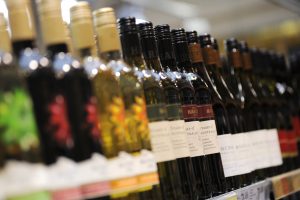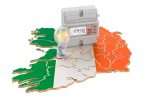An industry full of passion

Cormac Healy has been the director of Drinks Ireland since 2022
Cormac Healy has been the director of Drinks Ireland since 2022. Prior to this, he held the top role in Meat Industry Ireland (MII) for seven years so although relatively new to the drinks industry, he has plenty of experience representing industry in general and is very upbeat about the drinks industry, despite the various challenges that prevail.
“There is passion in this industry,” he says. “We have brands that we should be very proud of and are known the world over and this is often people’s first point of connection with Ireland. People are taking brave steps and building distilleries and creating visitor experiences and enticing tourists to this country.”
Drinks Ireland has clearly recognised that the industry is changing at pace and the 2022 Drinks Ireland campaign #MyDayMyWay illustrates that people of all ages are drinking more moderately and less, in particular the Gen Z cohort. Data from Revenue shows that alcohol consumption in 2022 was down on pre-Covid levels, with the long-term trend also showing that consumption continues to decline sharply, down 30% since its peak in 2001.
Alcohol free and zero alcohol

Cormac Healy has been the director of Drinks Ireland since 2022. Prior to this, he held the top role in Meat Industry Ireland (MII)
With alcohol consumption falling, the industry needs to adapt to how people socialise and what their preferences are and zero and low alcohol brands are certainly featuring strongly in the future of the industry so advice would be to ignore this category at your peril.
Healy believes that zero alcohol brands are offering consumers choice but there has been a negative kick back from the likes of Alcohol Action Ireland (AAI) for the advertising of zero products when the alcoholic version of the brand, with similar and recognisable branding, is prohibited from doing so.
According to CEO of AAI, Dr Sheila Gilheany, “Brand sharing means that children who see people drinking what appears to them to be alcohol – because of the same branding – will at a young age be conditioned to think differently about when and where it is appropriate to drink alcohol.”
Healy makes the point that in a market where you have growth, the industry needs to be able to market and make consumers aware of the choice and raise that awareness and also raise the availability too. “When you talk about the advertising and the brand sharing, consumers are likely to move to something or try something from a brand they know and love and they are familiar with. It’s logical that what they are looking for is a zero zero version of the product they already know and love. This is about real demand, and a real market and those who detract and say that this is some way to get around advertising rules, when we have some of the strictest advertising rules in the world here in Ireland, that’s just disingenuous as far as we are concerned.”
Speaking of demand, the size of the market share has grown four fold over the last number of years with Drinks Ireland’s recent beer report showing a phenomenal 25% growth in the zero alcohol beer market. Double digit growth is being recorded in Spain, Germany and Poland and also in the US and Healy says that is not beyond reasonable expectation that the same will happen here.
Premiumisation
The premiumisation trend has enjoyed growth due to the improvement of choice and innovation. There is an acceptance that after the pandemic people were looking to get out to treat themselves and choosing quality over quantity.
“We have looked at the Gen Z’ers and they have a different socialising approach and they have a different relationship with alcohol,” says Healy. “They are keen to be active and we’ve looked at ways of socialising that allows them to enjoy the whole weekend as well.”
However, he points out that beer is still very popular. “Last year in this market share went up to 43% so it’s still the most popular drink. The spirits home market was up 8% and our report out last week says export value is up about 17% to 1.5 million so that is meeting with that trend of quality over quantity and innovation in cocktails. Gen Z are open to premiumisation and into cocktails,” he explains.
Taxation
Anytime prices are mooted in Ireland, we can’t fail to mention taxation. It’s a constant issue we have and now have the highest taxation in the EU for wine and the third highest taxation for spirits meaning we are the outliers with Sweden, Finland and the UK.
Healy says that it’s not only that we are top of the pile for high tax but ahead of the ones below us by multiples so there is a really wide gap there. “Our call is to reduce it [taxation] and that the government would bring it back to something that is on a par with European norms. We’re heading towards a budget now and there is a call to reduce excise on alcohol and there is a capability for government to do it and I think it really would help the sector and ensure the viability of businesses.”
The VFI, the LVA and other hospitality groups had been seeking a continuation of the 9% VAT rate that applied to food but the government made the decision to increase the VAT rate to 13.5% – a 50% rise in the level of VAT at the start of September. That has unfortunately compounded the misery for publicans who rely on food sales to prop up their businesses.
Deposit Return Scheme

“We would like it if we were more aligned on an all-Ireland scheme with northern Ireland,” says Healy of the DRS scheme
The next big milestone for the industry to contend with is the Deposit Return Scheme. While Drinks Ireland understands that it’s a big undertaking for the trade and individual traders, it fully supports and accepts that the industry needs to embrace it. “Climate change and sustainability are important and trying to get us to achieve those targets is important and we all need to do our bit for that,” says Healy.
The deadline is 1 February, less than six months from now and Healy says there is a lot to be done. “A change of this level has concerns for producers of all sizes. There is a lot to manage in terms of the transition period and how stock is managed and that can have implications and it is even more challenging for small operators and they are looking to be supported in this transition. We would like it if we were more aligned on an all-Ireland scheme with northern Ireland. That clearly isn’t the case and it brings its own challenges in how the scheme had to be designed and that is being worked on in terms of bar coding etc.”
“We have seen the Scottish one sidelined so we need to make sure that we create as many synergies and alignments and there is an opportunity there to futureproof it as they are such important trading partners.”
“Communication around the roll out of the DRS is critical,” remarks Healy. “While producers on the drinks side are very familiar with it, there is a big focus to bring retailers and consumers along with it and that’s what we need to see.”
Health labelling
In recent months, another issue has come to the fore which many in the industry are baffled by. It is the new legislation on health labelling and many are questioning why the Irish government is going on a solo run. Healy says that the opposition is not just from stakeholders in the Irish market but there is massive international opposition to this too. “At the recent WTO meetings in Geneva, this has been raised by 14 countries and equally when you look closer to home there is very much a strong opposition to it from many EU member states. We saw a scenario when this was notified at Brussels level and there was unprecedented reaction to it and therefore we are extremely disappointed that the government has gone ahead and done a solo run on it particularly when there are plans at an EU level to look at health labelling of alcohol and the government here still has the opportunity to harmonise with that,” he says.

Healy feels like waiting for an EU led approach would certainly make more sense. “I know the legislation has been signed but there is a period of time, an implementation period of three years and we know there are plans to do this at EU level and the call from all other EU states is to harmonise and do this with us and there is nothing stopping the government from leading that at EU level and I think that is where their focus should be.”
“We have talked at length about the single market during Brexit negotiations and the integrity of the single market and here we are doing something that undermines the single market and makes it very difficult for trade and that’s what’s been said by other EU government. It’s also what’s been said by those from the US, New Zealand, Argentina or Mexico and and supplying to the EU market, they understand it to be a single EU market and here we are forced to make different production runs and different labelling.”
He goes on to say that he disagrees with comments saying that you don’t have to do separate labelling as it’s just an over-stickering that is needed. “Even if it were possible, that equally carries a huge cost for operators and huge logistical problems when you take a crate of beer. Do you have to open it all to sticker it? The logistics and the costs are huge. The stickers would have to be bespoke as the amount of alcohol, energy, ingredients would be different for each product. You can’t do that. We’re also going against existing EU approach to labelling of food and drink products and therefore we have to keep pushing that a harmonised approach and not that the government are being asked to do anything but to work with and harmonise and lead the discussion at an EU level.”
Could we jeopardise the products that are available to us here in Ireland by going on this solo run? He thinks that this sentiment is real and genuine. “I suppose this is going to be particularly challenging for small operators and producers. They’ll have to decide if it’s worth it. Some will say this is a prestige brand and I disagree with this label being on my product so we will see loss of choice to consumer’s on the market if we go on a solo run and don’t take an EU harmonised approach.”
Healy says that many of their members are raising the issue of labelling in general with the plethora of labelling changes that they are presented with. “We talk about health labelling. We have DRS changes to make and we may have environmental labelling requirements. Producers are struggling with this. It costs money to change labels and to redesign. We need to be more coordinated in what we are doing in relation to labels. A lot of companies are investing in QR codes on their products and they can cover a multitude and we worked at European level with Spirits Europe on a memorandum of understanding of using QR codes to carry information. It currently allows you to have different information for different markets and it allows you to make changes to the information without changing labels all the time. We have to get real about it but we need it to be sustainable.”








